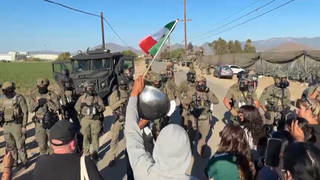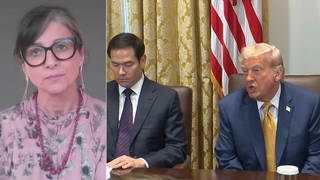
On Saturday, May 5, Anthony Mitchell died in the crash of Kenyan Airways Flight 507, which killed all 114 people on board. Based in Nairobi, he was an Associated Press reporter who had recently broken a story on secret prisons in Ethiopia and the U.S. involvement in the detention and interrogation of prisoners there. The world has lost another journalist, one who was taking the necessary risks to get at the heart of the complex and often ignored story of Africa.
Most Americans know of Somalia as the setting for the feature film “Black Hawk Down.” This film depicted the failed 1993 U.S. military assault on Mogadishu. Eighteen U.S. soldiers died. Less well known is that more than 1,000 Somalis also were killed. Somalia, which had been mostly ignored by the U.S. media, was briefly in the news as the U.S.-backed Ethiopian military overthrew the Islamic Courts Union, which had been controlling most of Somalia.
Mitchell’s exposé detailed the fate of some of the hundreds of thousands of refugees. They were fleeing war, but to the United States they were possible al-Qaida operatives who had found a safe haven in Somalia. According to Mitchell, dozens of refugees were “transferred secretly and illegally in recent months from Kenya and Somalia to Ethiopia, where they are kept without charge or access to lawyers and families.”
In his groundbreaking report, Mitchell wrote, “CIA and FBI agents hunting for al-Qaida militants in the Horn of Africa have been interrogating terrorism suspects from 19 countries held at secret prisons in Ethiopia, which is notorious for torture and abuse.”
The U.S. State Department documented Ethiopia’s use of torture, and the FBI admitted to Mitchell that it was interrogating prisoners there.
Several prisoners have since been released, including 17-year-old Safia Benaouda, a Swedish citizen. She was the first to report that uniformed U.S. military personnel arrested her and directed the Kenyan soldiers who took her captive. Amir Mohamed Meshal is also being held there. The 24-year-old U.S. citizen is from Tinton Falls, N.J. His family’s lawyer, Jonathan Hafetz of the Brennan Center for Justice at NYU School of Law, told me: “The U.S. admits that the FBI has interrogated him. The Red Cross and family have been denied access. We can’t get a lawyer to see him because we don’t know where he’s being held. It has been over two months, with no charge. We are calling for congressional hearings.”
Salim Lone, a columnist with the Daily Nation in Kenya, knows about terrorism. He was the U.N. spokesman in Iraq when the U.N. compound there was bombed in 2003. After the U.S. launched airstrikes against Somalia last January, Lone told me, “The world does want to help the U.S. end terror, but the way the U.S. repeatedly is doing it, from Iraq and Afghanistan to now in Somalia, this will increase the amount of terrorism that exists in the world.”
Make no mistake about it, the Horn of Africa is in the cross hairs of the United States. There is oil in Sudan, Somalia and Ethiopia. The New York Times reported that after the U.S.-backed Ethiopian invasion of Somalia, the U.S. allowed Ethiopia to buy arms from North Korea even though the U.S. had just won tough U.N. sanctions against North Korea.
The Pentagon recently announced the formation of Africom, the “new unified, combatant command” for Africa. Columnist Salim Lone’s response? “It’s the last thing Africa needs. … It’s going to militarize Africa; it’s going to inflame conflict. There is so much anger against the United States, especially if it’s in the Horn of Africa, which is primarily Muslim.”
Marc Lacey covered Africa for The New York Times from 2001 to 2006: “Africa correspondents spend a lot of time in the air, often on old planes. I think crashes are in the back of every reporter’s mind. Anthony Mitchell was a fearless reporter. He understood the complexity of the continent and cared.”
Our exchange with Africa must involve more than oil, guns and secret prisons. Once people know, they care. Shining a light, journalists provide understanding. We need more coverage of Africa, from African journalists and from reporters like Anthony Mitchell.
Amy Goodman is the host of “Democracy Now!,” a daily international TV/radio news hour airing on 500 stations in North America.
© 2007 Amy Goodman; distributed by King Features Syndicate











